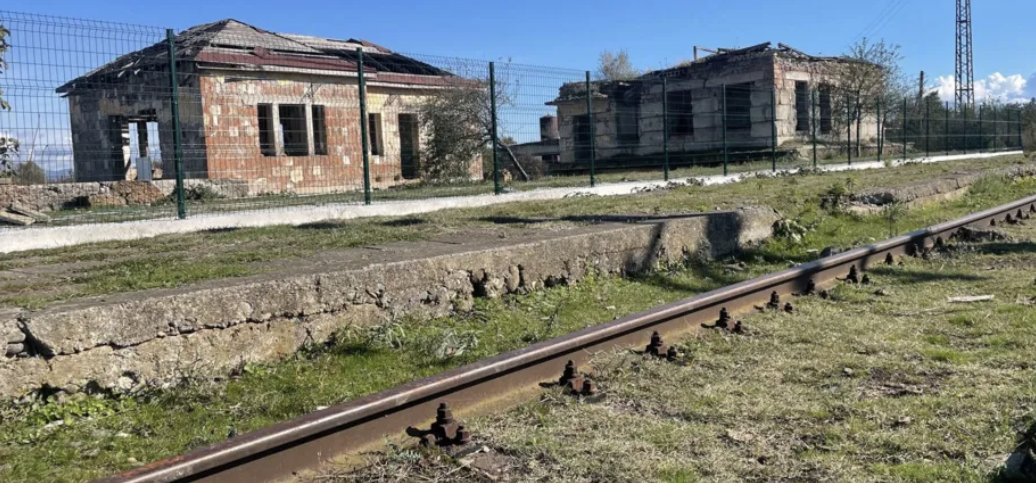
Georgians know all about Russia's wars. Several years before Russia invaded Ukraine, its army launched a five-day war in August 2008. The city of Gori was bombed and occupied, and a fierce battle further north in Shindisi left the station destroyed and the railway abandoned.
So when the country's four opposition groups label Saturday's pivotal election as a choice between Russia or Europe, their aim is to end 12 years of rule by the governing Georgian Dream party, who they accuse of drifting back into Russia's orbit.
They want to revive Georgia's stalled bid to join the European Union.
"In these streets we had Russians," says Mindia Goderdzishvili, running the campaign in Gori for opposition group Coalition for Change. "People here have this in their memories and the government uses this in a bad way, playing on their emotions because they want to stay in power."
Georgian Dream, known as GD, and its powerful billionaire founder Bidzina Ivanishvili vehemently reject the opposition's framing of the vote as a choice between Russia or Europe.
Theirs is the party of peace, they argue, while the opposition, backed by an unidentified "global war party" wants to drag Georgia into war.
A short distance from the bombed out station in Shindisi lie the graves of 17 Georgian soldiers who died defending the town. The separation line is not far north from here and beyond it is South Ossetia, one of two breakaway Georgian regions still under Russian military occupation.
"I don’t think anybody can guarantee Georgia’s security today," says Maka Bochorishvili, the head of Georgia's EU integration committee tells the BBC at Georgian Dream's new headquarters in Tbilisi.
"We are not members of Nato, we don’t have that umbrella over our head. The last war of 2008 was not long ago."
Her party still promises to take former Soviet republic Georgia into the European Union by 2030, but that commitment seems hollow when the EU has put the process on hold because of a law targeting "foreign influence" that threatens countless media and non-government groups.
Add to that a recent law targeting LGBT rights in Georgia, and it is no surprise that EU ambassador Pawel Herczynski feels that "instead of getting closer, Georgia is moving away from the European Union".
Georgia's pro-Western president, Salome Zourabichvili, has openly called for voters to support opposition groups, who have backed her plan for a one-year technocratic government if they win.
Much of the spotlight in this election has focused on Bidzina Ivanishvili, Georgia's richest man who made his fortune in Russia in the 1990s and is considered the guiding force behind the ruling party.
Ivanishvili has gone into Saturday's election promising to ban the biggest opposition party, the United National Movement, because of what it did before GD came to power.
UNM's former leader, Mikheil Saakashvili is locked up in jail, but GD wants to go after other opposition figures too, so the ban could extend far beyond one party. For that to happen, they would need to win a big majority.
That seems unlikely, although Georgia's opinion polls are unreliable and questions have been raised over the secrecy of the vote, despite a new electronic voting system.
Ivanishvili visited Gori during the election campaign and promised an apology to the people of South Ossetia for the 2008 war, which he blamed on Saakashvili's government, rather than the Russians who bombed the city.
The billionaire doubled down on that at the party's final campaign rally in the heart of Tbilisi on Wednesday. Speaking behind protective glass, he told supporters that the UNM had committed treason.
His rationale, presumably, is that by going after the biggest opposition party, voters will be dissuaded from backing any of the others.
For Aleksandre, a 30-year-old voter in Shindisi, the idea that Saakashvili started the war is "absurd".
Most of the people of his age have left the town because of the lack of opportunities there.
He would rather the government focus on reviving the railway line and protect Georgians from creeping Russian encroachment on Georgian land.
The Kremlin has made no secret of its preference for Georgian Dream.
A few months ago Russia's SVR foreign intelligence service accused the US of preparing to stage a Ukraine-style revolution in the streets to stop GD from winning a fourth term in office. The SVR had no evidence for its allegation, and the US denied it.
Now Russia has latched on to an unfounded allegation made by Georgian Dream's founder that a high-ranking foreign official asked Georgia's former prime minister to join a war with Russia "for three or four days".
"I don't see any reason not to believe [it]," Russian Foreign Minister Sergei Lavrov told Russian media.
Gori's memory of Georgia's northern neighbour is not based solely on what happened in 2008.
Soviet leader Joseph Stalin grew up here and tourists come here to see his childhood home and personal railway carriage, although the guides no longer gloss over the millions he sent to their deaths in Soviet gulags.
Opposition campaigners in Gori say some voters retain a lingering affection for the Soviet period, but that most people have moved on.
The broad consensus here and across Georgia is that their future lies within the European Union, rather than outside it. What is less clear is who they think will give them that chance.











